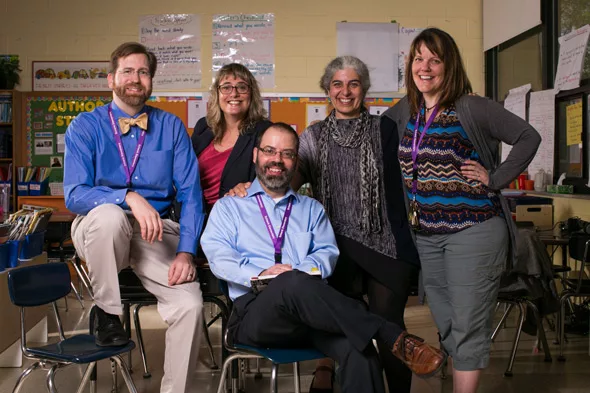A core purpose of this project is to evaluate and refine a piloted model of integrated school-based mental health services and expand the reaches of this program to multiple schools in the Madison Metropolitan School District (MMSD) and other Dane County district schools. The project is co-directed by Jeanette Deloya, MMSD coordinator of mental health supports, and academic partner, Dr. Tally Moses, associate professor of social work at the University of Wisconsin–Madison. Dr. Moses will carry out the evaluation component of the project.
MMSD’s model creates a comprehensive, integrated, culturally competent, trauma-informed program of direct services and supports for MMSD students and their families that links to primary health care and other resources in the community. Other partners including Catholic Charities of Madison and Public Health Madison & Dane County round out the model. Through the program, students are able to access mental health care and support when and where they need it – at school.
Data from MMSD shows that one in five students have mental health concerns that impact their learning. When socio-economic, race and cultural issues are factored in, only 20 percent of these students access mental health services.
“Some of these students need highly specialized, individualized mental health care in order to be present for learning and ultimately, to thrive,” said Deloya.
The students might be anxious or depressed, irritable, very withdrawn, have issues with substance abuse or self-harm or are suicidal. Yet because of barriers such as family stressors, lack of transportation, cultural and language barriers and lack of understanding about insurance and providers, they are not able to access the care they need through the typical channels within the community or health care system.
The goal of the project is to expand and refine the program at three pilot schools, identify system changes and help create a more responsive community/school mental health system. The clinicians are hired and supervised through Catholic Charities, Madison.
“The project evaluation will be ongoing with the aim of capturing the quality, impact and efficiency of various aspects of the program at the individual, school, and system levels,” said Dr. Moses. “The data will help us to identify what is working well and make changes as needed.”
Deloya said MMSD has been exploring models both locally and nationally. Their goal is to develop an evidence-based framework that helps students get to a therapist to receive the counseling they need. This model removes the significant barriers of transportation (often provided by MMSD staff) and the many hours spent by MMSD staff coordinating insurance, authorizations and providers.
“It’s an incredible benefit to students and families to have the kids be able to access therapeutic support right at school,” said Deloya.
It is also a benefit to teachers, classmates, and the community. “We have a more responsive school community and it enhances the school climate and culture for everyone,” DeLoya said. Teachers, school nurses and therapists are able to provide an integrated approach to care, and can help parents connect with a pediatrician or primary care provider who can become part of the treatment plan and team.
Dr. Emmett Durtschi, principal at Schenk Elementary, one of the pilot schools, has seen firsthand the impact of the program.
“Through the program, our school has been able to provide additional layers of support for our students with mental health needs,” he said. “Most importantly, we’ve been able to reduce many barriers to getting kids the mental health care they need.”
The program is currently piloted at Schenk and Glendale elementary schools and Sennett Middle School. In the 2016-2017 school year, Mendota and Leopold elementary schools will participate in the pilot. The project’s goal is to provide direct support to 900 students at up to 20 schools, and, over the grant’s five-year period, create an implementation strategy and best practices that can be shared with other schools and school districts in Wisconsin.
The Wisconsin Partnership Program represents a far-reaching commitment by the University of Wisconsin School of Medicine and Public Health to improve the health and well-being of Wisconsin residents through investments in research, education and community-academic partnerships. Established in 2004, the Wisconsin Partnership Program has awarded more than 420 research, education and community partnership grants totaling more than $184 million, aimed at improving the health and well-being of the people of Wisconsin.

